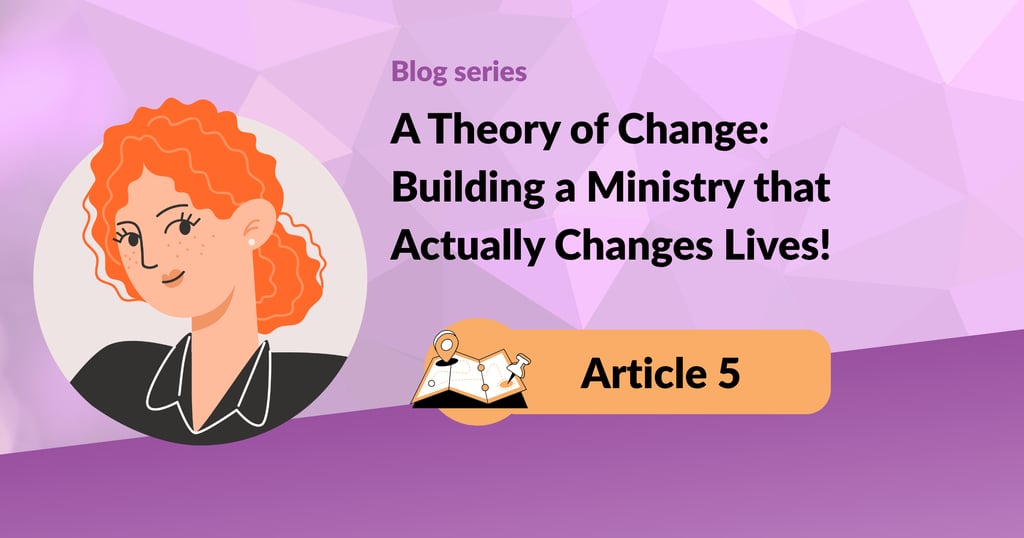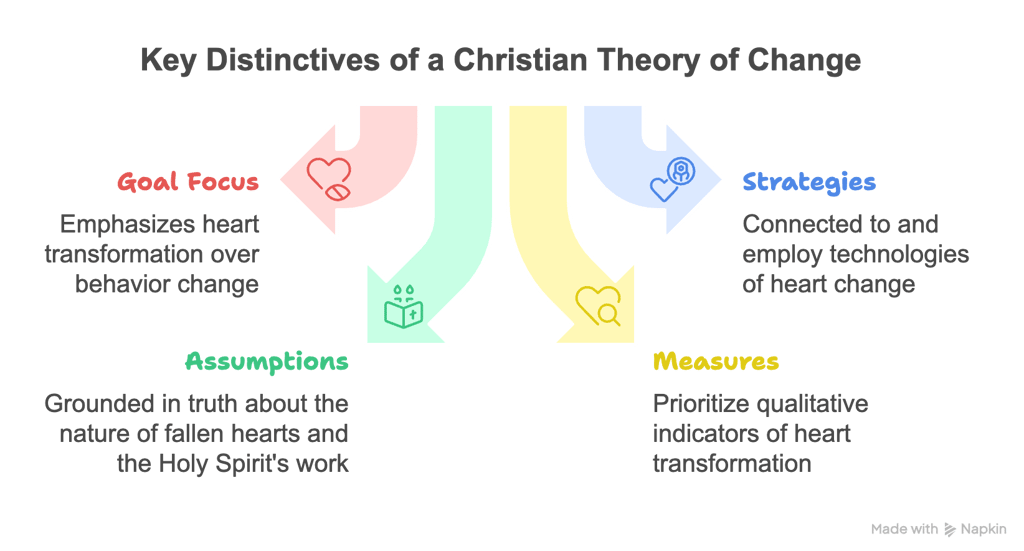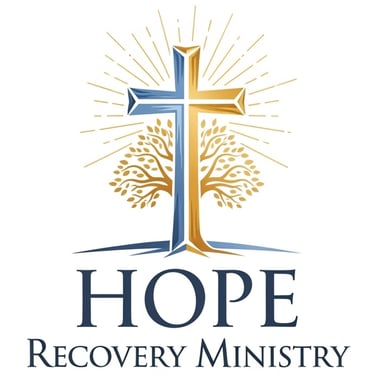5. From Heart Change to Your Change: Building Your Ministry's Theory of Change
Brandon Booth
6/30/20256 min read
Never miss a post! Signup for my email updates today and get expert guidance delivered directly to your inbox!
Last time we explored why information alone can't change lives and how heart-first ministry creates lasting transformation. You might be thinking, "Okay Brandon, I understand the theology of heart change, but how does this actually apply to my specific ministry?"
Today I want to show you how to bridge these universal principles into a specific Theory of Change for your unique ministry context.
There's a difference between understanding how hearts change in general and developing a clear theory for how YOUR ministry will create change. Let me show you exactly what I mean.
The Distinction: Universal vs. Specific
Why you need both a theology of heart change AND a ministry-specific theory of change:
A Theology of Heart Change (Universal):
This is what we've been building in articles 2-4. It's the universal "engine" that powers all effective Christian ministry, based on the 6 theological assumptions and 4 key strategies we've discussed. This applies to every Christian ministry regardless of context or focus.
This theology answers the question: "How do hearts change in general?"
Whether you're running a food pantry, leading a youth group, pastoring a church, or counseling married couples, the fundamental mechanics of heart change remain the same. Hearts are driven by desire, not knowledge. They resist direct change efforts. They're especially resistant to judgment. And they change in response to God's love and delight. Heart change is always a miracle of the Holy Spirit working through created things and people.
A Theory of Change for Your Ministry (Specific):
This is what we're building toward in the remaining articles. It's your particular application of heart-change principles to your unique calling. This theory is specific to your context, community, and ministry focus, and uses the 6-part Theory of Change framework we introduced in Article 2.
Creating a Theory of Change is a process that produces a document that helps you visualize the answer to the question: "HOW will your ministry create the specific change you're called to make?"
Your youth ministry will look different from a marriage ministry, which will look different from a recovery ministry. While they all operate on the same heart-change principles, they apply those principles in very different ways to address very different problems.
Why you need both:
The theology gives you the foundation and principles—the engine that powers your work. The specific theory gives you the roadmap and strategy—how you'll apply that engine to your particular calling.
One without the other leaves you either too abstract (you understand heart change but don't know how to apply it) or without proper foundation (you have activities but no clear understanding of why they work).
The 6 Parts Applied to Ministry Context
How does the Theory of Change framework work specifically for ministries?
Reminder of the 6 Parts of a Theory of Change (from article 3):
Identify a clear goal to fix a problem - What change are you trying to create? And what are the obstacles preventing that change?
Identify strategies - How will you accomplish your goal?
Identify activities - What specific things will you do while executing your strategies?
Identify outcomes - What changes will show you're making progress?
Identify measures of success - How will you know if you are accomplishing your goal?
Examine assumptions - What beliefs are you operating from?
How this differs from secular Theory of Change:
Your goal will involve heart transformation, not just behavior change. You're not just trying to reduce homelessness or improve literacy—you're seeking to help people experience God's love and have their hearts reoriented toward him.
Your strategies will be connected to the 4 key strategies we've discussed: facilitating encounters with God, using the Gospel-Law-Gospel sequence, employing technologies of the heart, and reframing spiritual practices as faith practices.
Your assumptions will be grounded in the 6 theological assumptions about heart change we explored in Article 3. Of course, you’ll also continue to examine your assumptions much more specifically at every step of the way.
Your measures will likely be heavily weighted toward qualitative indicators of heart change, not just quantitative measures. You'll be looking for stories of transformation, evidence of growing relationships with God, and testimonies of people experiencing his delight—not just counting attendance or tracking behavior changes.


A Sample Ministry Theory of Change
Let's walk through a concrete, but fictional, example. Imagine this like a quick draft or summary of a more complete Theory of Change document:
Fictional Sample Ministry: "Hope Recovery Ministry"
A ministry helping people overcome addiction through faith-based recovery


1. Clear Goal to Fix a Problem:
Problem to solve: Many people in the community are suffering with substance addictions.
Goal: Help people experience lasting freedom from substance addiction.
Assumptions/Obstacles to overcome:
Addiction is a heart problem, not just a chemical problem. Hearts are captivated by substances rather than God
Shame and guilt create barriers to seeking help
Lack of supportive community for recovery prevents many people from getting help
Information-only approaches to addiction recovery have limited succes
2. Strategies (rooted in heart-change principles):
Provide addiction recovery mentoring. This will facilitate healing emotional encounters with God through one-on-one relationships where people can experience acceptance and grace.
Provide safe and supportive community for recovery. This will facilitate encounters with God's love by creating safe spaces where people experience God's acceptance before addressing their addiction.
Provide effective addiction recovery education based on the 12-steps. This utilizes the Gospel-Law-Gospel approach and incorporates technologies of the heart, especially relationship and story.
Assumptions to check:
We can adequately train enough staff and mentors
The 12-step program is actually effective at freeing people from addiction
We can use the 12-step materials to create our own curriculum
3. Activities:
Monthly community outreach events to people struggling with addiction
Weekly Bible studies and recovery support groups
One-on-one mentoring offered weekly.
Retreats focused on experiencing God's love and delight
Assumptions to check:
We have access to office space and community space through local church contacts and the community center.
Retreats are effective at kickstarting recovery.
4. Outcomes linked to strategies:
For example, for the strategy "Provide addiction recovery mentoring," the outcomes might be:
Participants feel safe to share their struggles without judgment, so that they
Begin to experience God's love and delight in them personally, so that they
Learn effective coping strategies, so that they
Connect with supportive community and become positive contributors to it, so that they
Experience lasting freedom from substance addiction (mission statement)
Bonus outcome: Participants become mentors helping others find freedom
Assumptions to check:
We know effective coping strategies to teach and can adequately train mentors to teach them.
5. Measures of Success:
Qualitative: Stories of heart transformation, evidence of growing relationship with God, testimonies of experiencing God's delight, reports from family members and friends.
Quantitative: Number of participants who are still sober 6 months and 12 months after completing the program.
Notice how this quick draft of a Theory of Change is built on the heart-change principles we've discussed, but applies them specifically to addiction recovery. The same principles could be applied completely differently to youth ministry, marriage counseling, or church planting.
Your Next Step
Reflection Questions:
What specific change is your ministry called to create? Don't just think about activities—what transformation do you want to see in people's lives?
What are the main obstacles preventing that change? Think beyond surface-level problems to heart-level resistance. What keeps people from experiencing the transformation you want to facilitate?
How do the 4 key strategies (from Article 3) apply to your specific context? What would it look like to facilitate encounters with God in your ministry setting? How could you use the Gospel-Law-Gospel sequence? What technologies of the heart are available to you?
Simple Exercise:
Complete this sentence: "Our ministry exists to help [specific group of people] experience [specific transformation] by [brief description of approach]."
Example: "Our ministry exists to help struggling marriages experience renewed love and intimacy by creating spaces where couples encounter God's heart for them."
This exercise will help you begin to clarify your ministry's unique Theory of Change while keeping it grounded in heart-change principles.
What's Next
Every effective Theory of Change starts by clearly identifying the ministry's goal—the specific transformation you're called to create.
Next week, I'll walk you through Step 1 of building your Theory of Change: identifying the real problem your ministry exists to solve and the change you want to create. We'll dive deep into how to craft a clear, compelling goal that goes beyond activities to focus on the heart transformation you're seeking.
Ready to develop a clear Theory of Change for your ministry? I'd love to help you think through your specific calling and how to apply these heart-change principles to your unique context. Every ministry is different, and translating these universal principles into your particular situation requires wisdom and insight about your community and calling. Schedule a free 30-minute conversation with me, and let's discuss how you can build a Theory of Change that will guide and focus your ministry efforts.
-------------------
This is the fifth article in our series "A Theory of Change: Building a Ministry that Actually Changes Lives!" ← See the previous article, or check out the next article here →


Let's build!
Connect with me today and let's start building your ministry that will change lives!
© Brandon Booth, 2025
Expert guidance for nonprofits and ministries.
Brandon Booth



